PC game ownership in the digital age: what do you do in a post-ownership age?
Opinion: Do you want to own the games you pay for? We do

Do you buy a lot of PC games on Steam, the Epic Games Store and maybe even Origin or Battle.Net? We do too, and we often find ourselves struggling with the idea that we don't own any of the games we're dropping so much money on.
Unless you buy a game on a platform like GOG (Good OId Games) or Humble, you likely won't have a way to keep the game if the licensing falls through or the store goes under. We know its hard to believe that Valve will be shutting down Steam any time in the near future, but what would happen if Steam just didn't exist anymore?
Because the games sold on Steam aren't kept on any kind of physical media, it's unlikely that you'd be able to keep your games if the service ever goes under. So, should we go back to hoarding giant collections of CDs? Or do we just accept the current way of doing things and move on?

But, Valve has said ...
If you search online for "what will happen if Steam goes under" you'll see all kinds of forum posts where people are saying that Steam has systems in place to make sure that in the unlikely scenario where it ceases to exist, your games would be updated to not require Steam to run anymore. That's a nice idea, and it may even be true. But, the Steam Subscriber Agreement says differently.
According to the agreement that you agree to every single time you buy a game on Steam, "the Content and Services are licensed, not sold. Your license confers no title or ownership in the Content and Services." You're not buying the games, you're buying the license to use them.
It is still possible that Valve would release a patch that would let games be run without Steam in the case that the gigantic storefront ever goes belly-up, but it's likely this would only apply to its own games. You would be able to play Half-Life 2, but maybe not Dark Souls 3. This all comes down to one thing: licensing. We really don't see Square Enix, for instance, being cool with the DRM being stripped from something like Final Fantasy XV (or whatever the most recent one is when this theoretical Steam shutdown would happen.)
And, this isn't even unique. In EA's terms of use for Origin, it says "The EA Services are licensed to you, not sold. EA grants you a personal, limited, non-transferable, revocable and non-exclusive license to use the EA Services to which you have access for your non-commercial use, subject to your compliance with this Agreement." Epic Games Store says something similar, too.
Get daily insight, inspiration and deals in your inbox
Sign up for breaking news, reviews, opinion, top tech deals, and more.
Then, there's Good Old Games. Not only is its EULA (End User License Agreement) way more accessible than other platforms, but it doesn't explicitly say you don't own the games you're buying. And, because games sold on GOG are DRM-free, if the platform goes under, you should be able to download all your games and back them up on an external hard drive, or even CDs.
Either way, it's been a while since we've seen someone walking down the street carrying a binder of PC games on CD-ROM, and we don't think that's ever going to become chic ever again. But, who knows? The cassette is back.

What do we do now?
It's unfortunate that these licensing agreements that say we can buy games without owning them are the good old days, but it's kind of true. Now that we're starting to see all kinds of game companies launching subscription services like EA's Origin Access or Microsoft's Xbox Games Pass, we won't be buying games anymore, just like we're not buying albums or movies.
And, then there's the game streaming services like Google Stadia looming on the horizon, and we won't even own our gaming hardware anymore - that is if the limited bandwidth a lot of folks have doesn't hold game streaming back from attaining mainstream domination.
It's hard to actually think of a solution, and maybe there really isn't one. This all-digital age means that it's unlikely we'll ever see the best PC games being marketed as physical things ever again. The best thing anyone can do, then, is to be aware of what you're getting when you buy that new PC game you've had your eyes on.
And, if you just want to play the latest PC games, without really thinking about where they'll be a decade down the line, you probably don't have anything to worry about. Just don't expect that digital download of The Outer Worlds to become a collectors item, even if French lawmakers did say you can resell your games on Steam (but only in France).
Bill Thomas (Twitter) is TechRadar's computing editor. They are fat, queer and extremely online. Computers are the devil, but they just happen to be a satanist. If you need to know anything about computing components, PC gaming or the best laptop on the market, don't be afraid to drop them a line on Twitter or through email.
